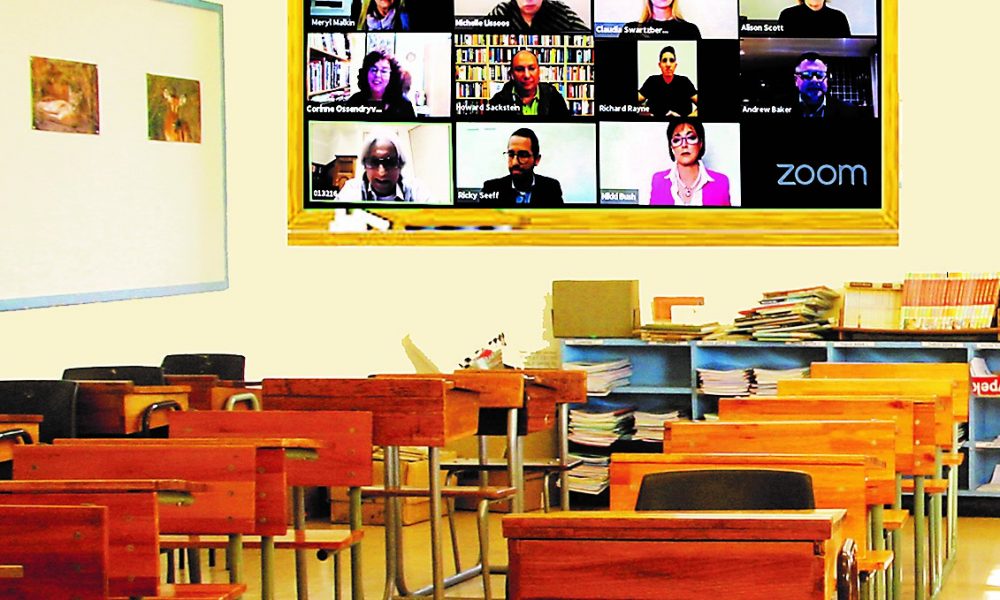News
Education ‘will never be the same’
COVID-19 has irrevocably altered the face of education as we know it. Schools and universities will have to find ways to navigate a blended approach to learning, the classroom, and computer sharing in a new reality of learning.

JORDAN MOSHE
This was the consensus of 15 educators, psychologists, and teaching experts who participated in a SA Jewish Report-hosted panel discussion on Tuesday evening about the new frontiers of education.
“We will never go back, and education won’t be the same,” said Michelle Lissoos, EdTech strategist and managing director of Think Ahead Education Solutions. “We will be creating new partnerships and moving forward with a new system that prepares our children and is more equitable for all.”
The situation has brought a massive shift for teachers and students in Jewish schools, said Rabbi Craig Kacev, the outgoing director of the South African Board of Jewish Education (SABJE).
“Teachers have managed to implement major change in moving from the classroom to online platforms,” Kacev said. “It’s tremendous what they’ve done in such a short time.
“We’ve learned about students’ capabilities, including their ability to learn independently. We’ve watched students who were introverted in the classroom come to the fore in this method of learning. The shift is still taking place.”
Andrew Baker, the principal at King David High School Victory Park agreed, saying that the current mode of online teaching was the very opposite of the school’s typical methodology.
“We’re not a distance-learning institution,” he said. “We’re in the business of face-to-face, intensely personal, relationship-based education.”
Fortunately, staff and students have risen to the occasion. “The entire staff shifted over a matter of days to a 100% online platform,” Baker said. “We were designing a curriculum we never thought we’d design in our lives – we were never trained to do it.”
The shift hasn’t worked in every student’s favour, however. Meryl Malkin, the social worker at King David Linksfield, stressed that it isn’t a one-size-fits-all situation. “Distance and online learning are very different from online schooling,” she said, meaning that schools have had to adapt their material. “Everyone will find a different way to learn. Many students are keen to get back to school, while others are more comfortable at home.
“School is about way more than pure academics,” she said. “A lot goes on at school that some students absolutely need like culture, identity socialisation, and structure. Some really need it, and some don’t. It depends on the student.”
Even when the crisis has passed, the changes wrought by COVID-19 will remain with us, said Lissoos.
“We don’t know when we’ll go back to school, [but when we do] we’ll have a different kind of teacher, a different curriculum, a different kind of child. We need to look at technology as an enabler of education. We can’t just push content.
“We’ve seen the education sector as one of the slowest to embrace technology. Some schools who have championed it for a while were using it meaningfully. We’re not judging whether it’s better than school. We’re using it as a stop-gap in a global crisis to find a way forward.”
Lissoos believes that our new reality gives us a unique opportunity to teach youngsters a new set of skills.
“For years, we’ve talked about giving our children 21st century skills,” she said. “Now we need to look at skills for a post-COVID-19 world. We can’t underestimate the skills our children are learning in this environment.
The outgoing vice-chancellor at the University of the Witwatersrand (Wits), Adam Habib, said that the discussions taking place at schools were the same as those at universities.
“We’ve been experimenting with online education for at least five years, but it accounted for only 15% of the academic base,” he said. “Over the past month, we’ve shifted almost 100% online.”
Habib stressed that Wits wasn’t offering online teaching but remote learning. “Our academic programmes aren’t configured for online,” he said. “We have emerging remote learning on an online platform, taking our curriculum and adapting it slightly to an online format.”
He said that a number of students and staff were opposed to the move, aware that many students lack access to devices and internet connectivity. “Some people will be left behind,” Habib admitted. “About 85% of our students have devices.”
“Social justice doesn’t mean going to the lowest common denominator. It means being conscious of inequality, and assisting those without access.”
For this reason, Habib said, Wits procured 5 000 laptops for students in need, and provided 30GB of data to every registered student. Over the past month, the student participation rate has been 86% – above that of typical lecture-based participation.
“We anticipated far more problems, and have been astonished at how well it has gone, but that doesn’t mean it will be perfect,” Habib said. “It means that in some form, the online format is here to stay. We need to come to terms with this. I don’t think we’ll ever go back to learning solely in the classroom, nor will it be only online.”
As we go forward, education will use a blended learning system, Habib said, with university programmes relying on digital and personal interaction.
“The old world in higher education is gone, whether we like it or not,” he said. “The new world is yet to be born, and we’re going to go through harsh birth pangs in the next 24 months.”